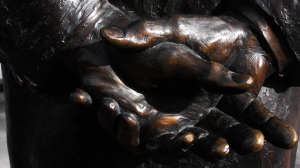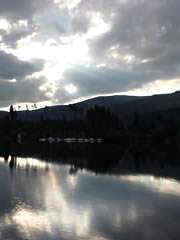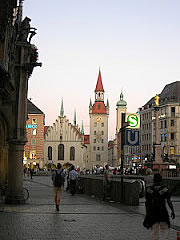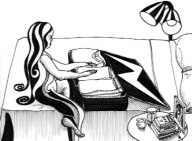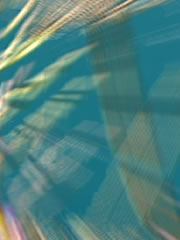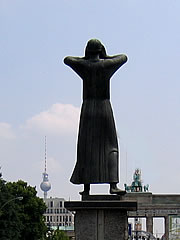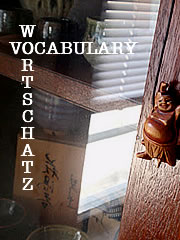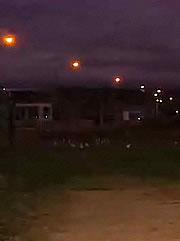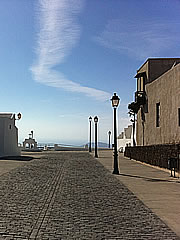June 22 2012 marked New Zealand’s National Flash Fiction Day so we’re celebrating at Aotearoa Affair with our June/July edition of the Blog Carnival. Here we introduce many different stories — some tragic, some light, some earthy-real, some surreal. Some with whisky, some with fries on the side. Welcome to Flash Across Borders.

* * *
flash in the trees and in small stones
 from Trish Nicholson, Runnin’ The River
from Trish Nicholson, Runnin’ The River
“How was it, buddy?” “Durn near the best prawns and chilli sauce I ever had, Vince.” “It was too, with all the right fixin’s an all. Plenty green ginger and not so much chilli that you couldn’t taste nuthin’ else – just like Ma made. She learnt me to cook. All the years workin’ in restaurants prawns was my specialty; never did tell the boss I dumped his recipes and used my Ma’s. Rest her soul.” Read the full story.
Trish Nicholson lives in the ‘winterless’ far north of New Zealand, and she shares her passion for writing, photography, travel, trees, and treehouses at her blog Words in the Treehouse.
*
 from Raewyn Alexander, For all my Friends
from Raewyn Alexander, For all my Friends
“Long ago when ewill took bold and would not let no, people tall well all over the whirl took up pens, pencils, keyboards and dictaphones with larkness they knew of themselves, to power and push words forth. So fine flew light and transmogrified ink. ” Read the full story.
Raewyn Alexander lives in Auckland and is a novelist, poet, short story and non-fiction writer who was placed in the top five for the Landfall Essay Competition, 2011. Her latest book, A Bee Lover’s Poetry Companion, is published through Earl of Seacliff. You can find more of Raewyn at her Poetic Journey & Trees for Travel.
*
from Martin Porter, The Unraffle
“To the people of Tlön, the unraffle was the ultimate in egalitarian chance, perhaps something even greater. Today, Joan had chanced to win. She already held her winning ticket as she arrived in the village hall. The prize, a basket of her home-made produce was beautifully wrapped in her finest transparent cellophane, so everybody could see her baking, her preserves and her homecraft. Excitement was mounting as the other participants, her competitors, were arriving and taking their places in the hall. ” Read the full story.
Martin Porter is retired and living in Whangarei in New Zealand. He studied Astrophysics and Physics in the UK. The Unraffle is a fable about chance, entropy and God, written in 335 words. Martin hopes to recover from the shock of writing it shortly. Martin blogs short fictions at Small Stony Notes and Jottings.
*
Daphne Clair, Eosin (written for Northland 24-hr Flash Challenge)
He gave her an apple this time for her birthday surprise. A cheap gift, she thought. She’d wished for jewelry or perhaps something intimate in silk and lace. Instead, he’d plucked an apple from the enormous greenhouse he’d turned into a stronghold with alarms and a padlocked door. No sloth, she had to admit, he toiled there daily over his experiments — banana-flavoured pears, lemons sweet as honey, purple-fleshed oranges, that she found unnatural and slightly sinister, and now…
“I call it Eosin,” he said. ”For its colour. Try it, Peaches.” Even his nickname for her was a fruit.
The apple was an almost fluorescent red. She bit into crisp pink flesh and sugary juice exploded into her mouth, ran down her chin and soaked the ruffle on her favourite blouse.
She left him that day. Nothing could bridge the canyon-sized gap between them.
In years to come “Eosin Splendid” made him a fortune but she didn’t care. Ironically perhaps, she took a job picking fruit that tasted the way it always had, and ended up marrying the orchardist, who, although no millionaire, bought her rings and necklaces for Christmas, and frilly underwear for her birthdays.
Daphne Clair de Jong has published an abundance of romance novels writing as Daphne Clair for Mills & Boon and Laurey Bright for Harlequin Silhouette, marketed worldwide. She is known for the feminist edge she brings to the genre. Daphne also writes poetry, non-fiction, short stories and historical fiction . Her awards include New Zealand’s premier BNZ Katherine Mansfield Short Story Award. Her solo collection, Crossing the Bar, was published in 1998.
..

* * *
changing perspective
 from Christopher Allen, Jamison’s Clarity
from Christopher Allen, Jamison’s Clarity
“Jamison blinked into the milky eyes of the mutt lying on the pavement next to him and tried to remember what people used to call him or where he’d once lived. Beyond the dog, his silvery skyscraper headboard mirrored a filthy, bedded-down and bearded geezer. Someone had draped him in a blue blanket—the kind one gets in aeroplanes, he thought. “Eureka, Topeka!” he shouted at his reflection, bleared brilliant by the a.m. sun. “I’ve been in an aeroplane!” Read the full story.
Christopher Allen (Guest Editor of last month’s Aotearoa Affair ‘Bi’ Blog Carnival) tells us: “Ten years ago as I was waiting for the tube in London, I found myself standing in front of an ad in which a very pale woman was holding a wine glass of urine. ‘Save yourself: Drink Urine’ was the message. And this is the crazy world Jamison has to redefine for himself.” A US-American, Christopher splits his time between Germany and the UK and knows quite a lot about writing across borders. His flash has appeared or is forthcoming at Referential Magazine, A-Minor and SmokeLong Quarterly, among others. He’s a man of few words. He blogs at I Must Be Off.
*
Graeme Lay, Points of View
Aware that most of the students in the writing seminar would be Polynesian, James decided to buy a Pacific Island shirt, to help make them feel more at home with the fact that it was a Palagi teaching them. Bought from a K-Road shop, the shirt was dark blue, with green breadfruit leaf patterns. It was cool and comfortable.
He began to plan his talk, the key element of which was the importance of deciding on a story’s point of view – whether to write it in the first or the third person.
The seminar was held in the school library. The students were Year 12, the boys huge, bursting out of their grey shorts and shirts; the girls immaculate in white blouses and long green skirts. Their faces were dark and handsome. James handed out the sheet of notes, headed ‘Points of View in Short Story Writing’. Then he went over the notes, explaining carefully the differences between first and third person narrative techniques. To illustrate, he read them two short stories, Toothache, by Frank Sargeson, and A Game of Cards, by Witi Ihimaera.
The students listened very attentively. One in particular, a strikingly attractive girl in the front row, fixed him throughout with lustrous brown eyes, hanging on his every word, watching him more closely than any of the others. Obviously, James thought, a top student. And Tongan, he guessed.
He concluded his talk. ‘So, I hope I’ve made it clear that the decision to tell a story either in the first or the third person is a crucial one, when you’re writing.’ He paused. ‘Now, do you have any questions?’
Eyes bright, the hand of the beautiful girl in the front row shot up.
‘Yes?’ said James, gratified.
‘Where did you get your shirt?’ she asked, eagerly.
Graeme Lay writes fiction for adults and young adults. The author of four short story collections of his own, he has also compiled and edited eight anthologies of short fiction, including five volumes of the very popular short short story collections. His latest adult novel is Alice & Luigi, while his non-fiction includes three collections of travel writing and the historical work In Search of Paradise – Artists and Writers in the Colonial South Pacific (Random House), which has been selected for featuring at the 2012 Frankfurt Book Fair. He also works as an editor and manuscript assessor from his home in Devonport, Auckland, and most recently he served on the judging panel for New Zealand’s 2012 National Flash Fiction Day Competition.
*
from Kathryn Jenkins, Fireproof
“We laughed about the shirt his mother gave him, “treated with special flame retardants,” the label declared. Perhaps, we joked, if he wore it to work it would protect him from being fired. But it’d been a good year. Everyone was whispering about big bonuses, not redundancies.” Read the full story.
Once upon a time Kathryn Jenkins only dabbled in flash fiction but in 2012 she began writing with more frequency and now finds it difficult to stop. Her first flash fiction was 50 words long and written 15 years ago. It appeared in Brian Edwards’ Book of Incredibly Short Stories. Fireproof also began as a 50-word story.
.

* * *
dancing and dreaming
from James Claffey, cut blooms & dreams
“With purpose, relentlessly back and forth, the brush sweeps the grass cuttings from the flags, her hips sway: an afternoon garden dance. The pink rose by the door flushes an impatient hue, its energy sickle-scented mythic. In the sun she finds comfort in the wooden handle’s rotation, the narrow lines ribbed a thousand times, hands grooved to a familiar shape.” Read the full story.
James Claffey hails from County Westmeath, Ireland, and lives on an avocado ranch in Carpinteria, CA, with his wife, the writer and artist, Maureen Foley, their daughter, Maisie, and Australian cattle-dog, Rua. He received his MFA from Louisiana State University, where he was awarded the Kent Gramm Prize for Non-Fiction. His story Rare Glimpse is the winner of The Linnet’s Wings Spring 2012 audio competition in prose. His work appears in many places including The New Orleans Review, Connotation Press, the Drum Literary Magazine, and Carte Blanche. He blogs at The Wrong Corner of the Sky.
*

from Dorothee Lang, Antelope Summer
“It was the summer of vuvuzelas. The ball rolled on and on, down there in the South of Africa, between all those countries of the world. Huge screens glowed in the night, green reflections of success and failure.” Read the full story.
Dorothee Lang is a freelancer, writer and traveller, and the founding editor of BluePrintReview, an experimental online literary and visual arts journal. She lives in the middle of Europe and always was fascinated by languages, roads and the world, themes that reflect in her own work and collaborative projects she is involved in – like the Aoteaora Affair Blog Fest, curated together with Michelle Elvy. Her new book “WOR(L)DS APART”, a true story about a friendship across cultures is upcoming this July at Folded Word. For more about her, visit her at blueprint21.
*
Sian Williams, Hôtel Montmartre (in Flash Frontier, June 2012)
At Charles de Gaulle they searched his bags – even the customs officer thought he looked furtive – while she felt dizzy in the toilets.
He held her shaky hand on the airport bus. She wished he wouldn’t – it seemed indecent, somehow pornographic.
Their room was on the fifth floor, an attic with a sharply sloping roof, and high dormer windows giving a tiptoe outlook onto air-conditioning units, TV aerials and plastic guttering. There were no distant views of Sacré Coeur.
Everything about the room was mean and cramped: the bed, the wardrobe, the bathroom-in-a-cupboard, even the basin. The room was too small to contain their love which sloshed about on the cheap carpet, trickling under the door and running down the stairs. In a rising tide it lapped at the bedroom walls until it overflowed through the window, upsetting the roosting pigeons and cascading down into the street below where it filled the gutters on either side of the road, washing away cigarette ends and cabbage leaves – and any remaining guilt they had about his wife back in Gateshead.
Afterwards they walked the narrow streets hand in hand. Everything seemed sharper, more clearly focussed than before, as though the world had been slightly off channel and was now tuned correctly.
Suddenly hungry, they went into a fromagerie. The shop assistant asked how much brie they wanted. “Like this?” she said, gesturing with her knife. “Or more?”
“More, please,” they said. “We want more.”
Sian Williams writes both fiction and non-fiction for adults and children. In 2011, her writing received the NZSA Northland Award, was short-listed for the Whakatane Library Short Story Competition, and was highly commended in the South Island Writers’ Association National Flash Fiction Competition. Her short story “The Kingdom of Air” was short-listed in the Fourth Quarter 2011 Flash 500 Competition and “A Charm for Warts” was short-listed for the Fish Publishing Flash Fiction Competition 2012. Sian edits short short fiction every month at Flash Frontier.
*
 from Michelle and Lola Elvy, Two Cups of Tea (originally published in Thunderclap!)
from Michelle and Lola Elvy, Two Cups of Tea (originally published in Thunderclap!)
“Ruby loved dragons so much she talked to them during the day, dreamed of them at night, and learned to ride them like the wind. Hers was a world of scales and sky, feathers and fire. People said Ruby got her imagination from her mother Agatha, but Agatha knew better, for she was a novelist who had written nothing in a decade.” Read the full story.
Michelle Elvy is a writer and editor living in Northland. She can be found at Flash Frontier, Blue Five Notebook and A Baker’s Dozen, and along with Dorothee Lang curates the Aotearoa Affair Blog Fest, celebrating Kiwi and German writers in anticipation of the 2012 Frankfurt Bookfair. A Pushcart nominee, Michelle has widely published poetry, fiction and non-fiction and is presently working on a collection of very short stories set in historical New Zealand.
Lola Elvy is a reader and writer but not always of short fiction. She is presently reading Cornelia Funke’s Inkspell whilst daydreaming her way through the school holidays. She pays attention to small things, especially when writing poetry and bending paper into origami.

* * *
mystery and meaning
Marcus Speh, Contraption/ Im Irrenhaus
When you first enter a madhouse as an inmate, your learn to fear the sounds: dreams rumble and rattle across the corridors. Giant birds kept in tiny cupboards shriek senselessly. Even the silence is loud when your mind has faltered and turned against itself. But soon, these sounds become your new world. So much so that you fear to ever leave it: when you are picked up by your family for the weekend, anything will unnerve you—the bark of a dog, a whimpering of a child, the pure ringing of a bell. Even the rustle of a skirt over the leg of a woman will stir you and make you crazy. You’ll feel forced to interpret these sounds which seem regular to your kin and to prove to them that they in fact are the mad ones. All crazies are like that, except perhaps those who were born stone deaf. Their fantasies hold no sound: to them, people who speak just move their lips like animals licking the air with tied tongues. Anything that falls to the floor in their world falls like a feather, toneless, as if they lived on a planet without atmosphere, a muted asteroid. Only the deaf idiots can stand the clattering of coffee dishes and cake spoons on the family afternoon table. They smile upon the loony sizzling of the Sunday roast in the oven. When they’re overwhelmed they simply close their eyes.
 German transl: Im Irrenhaus
German transl: Im Irrenhaus
“Ich stelle mir vor: das Bibbern der neu Eingelieferten, wenn sie zum ersten Mal die Geräusche des Irrenhauses wahrnehmen, Geräusche, die ihre ganze Welt bedeuten, so dass wenn sie als Freigänger ein Kind weinen hören oder das Bellen eines Hundes, das reine Läuten eines Glöckchens oder auch nur das Rascheln eines Rocks über einem Frauenbein, sie dort Wahn vermuten und den Tönen absonderliche Bedeutungen unterschieben müssen.”
Die ganze Geschichte / The whole story: hier
Marcus Speh is a German writer who lives in Berlin and writes in English. His short fiction has been published in elimae, kill author, PANK and elsewhere. First published in 2009 at Metazen, his work has been nominated for a Micro Award, two Pushcart Prizes, two Best of the Net awards and two Million Writers Awards, and was longlisted for the Paris Literary Prize. Known as a staunch supporter of penguin rights and maitre d’ of the legendary DADA venue Kaffe in Katmandu, he blogs in English at marcusspeh.com and in German, too, at marcusspeh.de. MadHat Press will release Marcus’ collection of short fiction, Thank You For Your Sperm, later this year. Marcus was recently interviewed at Flash Frontier.
*
 from Myra King, Dust to Water
from Myra King, Dust to Water
“I stand near the old pier, looking out over Lake Wendouree. There has been enough rain to make a difference – the lake is filling slowly and soon it will cover Edith Delaney’s secret forever or for at least another lifetime. After all, the last time the lake dried up like this was in 1869 – fifty years before Edith was born.” Read the full story.
Myra King‘s walls are papered with her scribblings, some of which have got matching awards, but in neater script. She has a portfolio of rejections interrupted with acceptances from magazines far, far away (from Australia where she lives) with the unlikely names of Battered Suitcase and Meat for Tea. Among other print or e-journals and magazines, she has work in Up The Staircase Quarterly and Fast Forward Press, so she is moving upward and onward. Her novel Cyber Rules(Amazon Kindle) proves that some have husbands who are also psychopaths. All royalties from her book sales go to Medecins Sans Frontieres: Doctors Without Borders. She blogs at Getting Hitched.
*
Jac Jenkins, He Was He And I Was I (written for Northland 24-hr Flash Challenge)
He is a writer and a philosopher. I am a beauty therapist, offering cheap skin treatments to wannabe beauties. We reached for the same apple at the same time at the Bridge Café. That’s how it started — with a sharp intake of breath. Five weeks later we exhaled.
He said microdermabrasion would lead him to laugh; the word itself a tickle. I stared and said, “I don’t understand, I’m not ticklish.”
He spoke of metaphysics; the psychedelics of the Universe; the vividness of the unknown. I said, “There’s nothing beneath the underneath and space is simply spacious.” He said, “Space is not a vacuum, but a banquet.”
He read aloud what he wrote at night: thirteen hungry ghosts circling a howly moon in a dark sorrow-sky. I said, “I’ve never heard the moon howl.” He said, “It only happens when you sleep.”
I left as he slept.
.
Jac Jenkins lives rurally near Whangarei with a teenage daughter, two cats and five chickens. She currently works as a librarian, a thousand times removed from her initial career as a veterinarian. She has been writing poetry since she was a teenager and recently completed a poetry-writing course through NorthTec. She has been published at Flash Frontier
and was recently highly commended for her story submission in the 2012 National Flash Fiction Day competition.
*
from Townsend Walker, Holding Tight(in Grey Sparrow Summer 2011 issue)
“I heard that shrieking whistle blow,
Mean, hard and screaming low,
Lying in my cold, cold bed,
Wrapped round my darling, my dear dead Fred
That’s the song she was singing when I walked into the Red Devil Lounge.Naked girl twisted around a dead guy; that’s what come to mind. Sent shivers through me. Not sure I even registered the rest of the song.
She was a new act. Doreen Hart. Dark brown hair, skin pale in the stage lights, slim girl, on her way to becoming a woman. Could kind of tell from the way she moved: like she wanted to be sexy, but ended up awkward. Nice voice, bit of huskiness to it.” Read the full story.
Townsend Walker lives in San Francisco. His stories have been published in over fifty literary journals and included in six anthologies. Two were nominated for the PEN/O.Henry Award. Four stories were performed at the New Short Fiction Series in Hollywood. His collection A Little Love, A Little Shove is forthcoming from Shelfstealers Press in early 2013. He blogs here.

* * *
observing small things
from Alex Pruteanu, Digits
“Joyce never worked for me.
none of it.
(nunavut.)
not Portrait not Dubliners, Ulysses,
nor Finnegan’s.
should
‘ve if you think about it.
based on labels: ɯsıuɹǝpoɯ
ima
gism”
Read the full story.
Since emigrating to the United States from Romania in 1980, Alex Pruteanu has worked as a day laborer, a film projectionist, a music store clerk, a journalist/news writer, a TV Director, and a freelance writer. Currently he is an editor at NC State University. Alex has published fiction in PANK Magazine, Camroc Press Review, Specter Literary Magazine, Connotation Press, and others. He is author of novella Short Lean Cuts (Amazon Publishing) available as an e-book at Amazon and Barnes & Noble, and in paperback at Amazon.
*
Frances Mountier, Hedgehog
 One lunchtime at Christchurch South Intermediate, Siobhan found a baby hedgehog. It was small, littler than her balled fist, and it was next to the basketball court, not moving. The boys on the basketball court were cool and tall and wouldn’t give a shit about a baby hedgehog, might even stand on it intentionally. There was a big difference between standing on a bug, and standing on a little animal, with a furry underneath, and dark spikes that started white at the bottom, a little hedgehog that would be a lump under your foot. A little hedgehog that even now was poking its head out, its brown eyes big and scared. Siobhan pulled her maroon jersey sleeve over her hand and picked the hedgehog up. It was a bit prickly, but its spines went backwards and were small enough that she could do it without them breaking her skin. She carried him past the cool boys, round to her mates. Then she wasn’t so sure what to do. The boys in her crew said, ‘He’s sick, he needs to be killed. It’s the good thing to do. Kill him.’
One lunchtime at Christchurch South Intermediate, Siobhan found a baby hedgehog. It was small, littler than her balled fist, and it was next to the basketball court, not moving. The boys on the basketball court were cool and tall and wouldn’t give a shit about a baby hedgehog, might even stand on it intentionally. There was a big difference between standing on a bug, and standing on a little animal, with a furry underneath, and dark spikes that started white at the bottom, a little hedgehog that would be a lump under your foot. A little hedgehog that even now was poking its head out, its brown eyes big and scared. Siobhan pulled her maroon jersey sleeve over her hand and picked the hedgehog up. It was a bit prickly, but its spines went backwards and were small enough that she could do it without them breaking her skin. She carried him past the cool boys, round to her mates. Then she wasn’t so sure what to do. The boys in her crew said, ‘He’s sick, he needs to be killed. It’s the good thing to do. Kill him.’
‘Piss off,’ she said.
‘Don’t swear at me. Here, I’ll do it. It’s the humane thing to do.’
‘No it’s not,’ she said.
They went on like this, so much so that she would have gone to a teacher if she thought a teacher would have been able to do anything, if a teacher wouldn’t yell at her for having a hedgehog in her hand. She pulled down her other sleeve with her teeth so it was covering her right hand, and laid that over the hedgehog. She wasn’t in any teacher’s good books anyway.
‘Shut up,’ she said. The boys were crowding around her. She stood and walked towards the toilets, but they started to tease her. So she walked to the school gate – not the main one with the teacher, but the one behind the hall – and climbed over it. It was only up to her chest but as she did so, she dropped him. Her little hedgehog. She jumped over, landed. ‘What did you do now, dick?’ one of the boys said. She leant down to pick her hedgehog up but he wasn’t moving. She pulled down both her sleeves, picked him up gently. He felt different underneath than before. She walked away fast, didn’t look back, didn’t listen for any teachers yelling.
She got home and went in the back door, straight to the kitchen. She was crying by now. Mum was there, washing dishes at the bench. Her little brother Tommy was sitting at the table, drawing a large picture with green crayon. She’d forgotten he was home sick.
‘Siobhan, what’s wrong?’ Jewel said.
Siobhan held out the dead hedgehog.
‘Why have you got that dirty thing?’
Siobhan couldn’t really speak. Tommy was looking up at her, eyes wide.
‘What are you looking at, moron?’ Siobhan said. ‘I dropped him Mum.’
‘Accidents happen, love,’ Jewel said.
‘We can b-b-bury him,’ Tommy said.
And that’s what they did, in the back yard, near the walnut tree. Even though the soil was hard and they only had a small shovel, and spoons from the kitchen drawer. Tommy dug the most, until it was about a hand’s-height deep. Then they laid her little hedgehog in. They shovelled the dirt back on top, only Siobhan was crying again. Tommy ran around the front of the house then came and pushed something into her hand. A marigold. She went to lay it on top but Jewel was patting down the soil.
‘Stop!’ Siobhan said, pushing her away. ‘Don’t do that.’
‘Why not? That’s what you’re supposed to do.’
‘No, it’s not. It’s just not, okay Mum.’ Siobhan laid the flower on top of the wee mound of dirt.
Later, her big sister would come home and nark on Siobhan for being out of school. Then once she’d realised Mum already knew, she’d say it wasn’t fair that Siobhan and Tommy got the day off. When she heard about the hedgehog she’d go out to look at it and come back and ask Siobhan how it died. ‘What happened to it Siobhan? Did it see your ugly face and just die? Was it sick and manky like you? Did you kill it?’
But at the funeral, it was just Siobhan and her mum and her little brother, and a small grave with some dirt spread around it, two spoons, and the shovel. A marigold on top. A wee smudge of blood on the left-hand sleeve of her jersey.
Frances Mountier grew up in Christchurch and lives in Petone. Her short stories have appeared in Hue & Cry, Sport, Turbine, Renegade House and JAAM. She is working on a novel consisting of many ‘tellings’ about a Christchurch family.
*
 from Sue Uden, Alternative Treatment
from Sue Uden, Alternative Treatment
‘No ice! How can a restaurant on a beach have no ice?’ The finger is swelling fast, a huge blood blister appearing over the middle knuckle. Ginny’s screams have reduced to a hiccupping whimper; her blonde curls, clumped into perspiration soaked strands, stick to her flushed cheeks. Turning her back on the concerned, sun-wrinkled face of the woman in the bar, Leila runs back down the beach; the child scooped onto her hip.” Read the full story.
Sue Uden was born in Eastbourne, East Sussex and now lives in Chichester, West Sussex with her husband. On leaving school Sue entered the dubiously reputable institution, The University of Life, by marrying at age eighteen and having her first baby the following year. When her children were of school age, she embarked on a diverse ‘career’ encompassing a medley of different jobs. Since her retirement Sue has determined to devote more time to her passion for books and writing, and her first novel Dear Dee was published in March 2011. Sue blogs at WELCOME .. – A Writer’s Life!
.
* * *
unexpected paths
from Mike Crowl, Running and Waiting (first published at Flash Frontier, February 2012)
“The rhododendron, paler than white, leans in the heat towards the path which is sunk below the road. The glistening heat has melted the rhododendron petals off the branches; they settle as browning water lilies in the grass. But the grass doesn’t pour down towards the path because it isn’t water.
The path is a deep dip, so that a child can race with her dog down one side and make it up the other before running out of puff.
The child runs down the path, her knots of knees pumping past faster than the eye can grasp.“
Mike Crowl is a New Zealand writer whose fantasy musical, Grimhilda! (which he composed and co-wrote), was performed in Dunedin, NZ in late April-early May this year. He has been experimenting with more traditional poetic forms over the last year, though his poems tend to a tongue-in-cheek flavour. Flash fiction is a new form of writing for him, and he’s intrigued by the challenge of creating a story/world within very few words. He blogs at Mike of All Trades and several other places.
*
 Andrew Stancek, In the Manger
Andrew Stancek, In the Manger
The woman sits at the bar, twirls a swizzle-stick in a tall glass, shows a lot of leg.
I would kill for a cigarette but chew withdrawal gum instead. I breathe in desert heat, throat raw, think four hundred and thirty seven days. I’m sick of counting, of missing Darla. This raven-haired one is nothing like her but she might help stop the ticking. “Let’s go look at the stars,” I say, as I settle on a stool next to her.
“It’s three in the afternoon,” she rolls her eyes, looks over at the bartender. “And it’s raining.”
I shrug. “Maybe we can find some in my room.”
By the time Darla left me, we were all snarl and bite with each other. A miscarriage and then a stillborn destroyed whatever we once had. She was right to go, I knew, but that did not stop our slow dying.
Raven looks as if she might like bite, has looked death in the face. I ask the bartender for a bottle of Jameson’s to take with me. Raven says, “Just one?” and I get another. Our screams in the motel room are louder than the voices in my head and the bottles are empty before I fall asleep. We don’t bother to look for stars.
I wake up convinced I hear Darla mumbling. I reach for her. The bed is empty. The light coming through the blinds hurts my eyes but it’s not DTs. Chainsaws are having a convention behind my eyelids but what I see is a burbling baby in a bassinet, no Darla and no Raven.
I don’t do authorities.
I check a Jameson’s bottle for a little cheer but no such luck. The baby coos, kicks its legs, craps. My mysterious benefactor provided a package of disposables and a baby bottle with the insides still warm, two pink outfits, a rattle and three soothers. My fingers shake but I manage to change her. Her outfit’s warm. I feed her, burp her, watch her fall asleep. The blanket has an embroidered “D”.
Normally I have a hard time thinking as far as scrambled eggs in the morning but the baby gives me an adrenaline rush. When the woman in the motel office asks, “Everything fine, no problems, sir?” I don’t say, “Did you put a baby in my room during the night or see who did?”
My truck is the only vehicle in the parking lot. I strap the bassinet into the seat next to me, look into the morning sky. A bright star is on the horizon. I rev the motor and head towards it.
Andrew Stancek was born in Bratislava and saw Russian tanks occupying his homeland. His dreams of circuses and ice cream, flying and lion-taming, miracle and romance have appeared recently in Tin House online, The Linnet’s Wings, Connotation Press, THIS Literary Magazine, Flash Fiction Chronicles, Thunderclap Magazine, Istanbul Literary Review and Pure Slush.
*
from Rachel Fenton, What Little Town
“When we’re secure.’ The knot’s too tight.
A bright red double decker hisses, honks to a stop. The top’s missing, full of tourists. Here is the church, here the steeple. Look inside. Hunter stops tugging at his tie, gives me his dog carried from the battlefield look. ‘We’ve only been here a month, another, few, we’ll be set.’ He pulls the curtain.
‘I’m late.’
‘Me too. Don’t make dinner.’ The door doesn’t bang.”
Born in Yorkshire, currently in Auckland, Rachel Fenton has work in Horizon Review, Otoliths, Blackmail Press, Brief, Monkey Bicycle , Flash Frontier and others. Shortlisted for the “Fish One Page Prize,” “Binnacle Ultra Short Competition”, and longlisted for the “Sean O’ Faolain International Short Story Prize” and “Kathleen Grattan Award,” she won the 2012 “AUT Creative Writing Prize” for her graphic story Alchemy Hour. She was Guest Editor for The Aotearoa Affair “Past Myths, Present Legends” Blog Carnival. As Rae Joyce, she writes an epic graphic poem about stuttering and migration, Escape Behaviours. She blogs at Snow Like Thought.
*
 Bernard Heise, The Potato Head Principle
Bernard Heise, The Potato Head Principle
Revlon’s development of the Mr. Potato Head principle for human applications had revolutionized the beauty industry, and kits were now available from a number of manufacturers. They could be bought cheaply at Costco and Sam’s Club, but you had to be wary of ones that were made in Pakistan and the Szechwan province of China, for they reportedly caused gangrene. In the mornings, Jerry would shuffle down the stairs and take his place in the greasy diner below his apartment run by the Polish lady. And carrying his breakfast, she would greet him with a different face each time – one day with eyes that were big, round and accentuated by heavy lashes, the next with glistening star-shaped pupils and no irises at all. Her nose might be flat and broad or long and thin, and sometimes it would dangle. Some mornings her ears would be pinned flat to her head, but other times she would accessorize with auricles that fanned the air. “Do you fancy me today?” she’d ask him with a smile, sometimes toothy, sometimes not. “It’s not quite right,” he’d inevitably respond, though her look quite often turned him on. They’d laugh, their flirting done with for the day. And he would polish off his eggs, sausages and toast, read the comics in the Vancouver Sun, and leave a fistful of dollars on the table. Then he’d shuffle off to work at the pickle factory, wondering whether he would recognize any of his friends.
Bernard Heise lives with his family on a sailboat in New Zealand. On occasion he finds the time to write some short fiction and take a few photos. His photography has been featured at Blue Five Notebook and more about him can be found here. This story first appeared at 52|250.
*
 from Kay McKenzie Cooke,The Bell of Lough Lene “Theway it entered the water would’ve been like a stone hurled high, dropping straight down, thunk, like a cut through the water’s skin. I picture trees. Probably different from our trees here in New Zealand. I imagine the darkness as the bell fell. I imagine fog all over the island and swirling around the lough. A lough is what we would call a lake.
from Kay McKenzie Cooke,The Bell of Lough Lene “Theway it entered the water would’ve been like a stone hurled high, dropping straight down, thunk, like a cut through the water’s skin. I picture trees. Probably different from our trees here in New Zealand. I imagine the darkness as the bell fell. I imagine fog all over the island and swirling around the lough. A lough is what we would call a lake.
The small bell lay there at the bottom of the lough for hundreds and hundreds of years until discovered by a boy, about my age, fishing for eels.”
.
Kay McKenzie Cooke hails from Dunedin, Otago, New Zealand. She has had two books of poetry published by Otago University Press, Feeding The Dogs (which won the Jessie McKay Prize for Best First Book of Poetry at the 2003 NZ Book Awards) and Made for Weather. She is working on her third book of poetry titled Born to a Red-headed Woman. She is also writing prose that although fictional, is imbued with the voices of her ancestors from Southland (and beyond).

* * *
boys & toys
from Tim Jones, A Short History of the 20th Century, With Fries (published in Flashquake, Fall 2004)
“By the time they got to the Finland Station, Lenin and his posse were famished.
‘What’ll it be boss, Burger King or McDonald’s?’ asked Zinoviev.
Lenin rustled up the kopeks for a quarter-pounder and fries all round and they set to chowing down. By the time he finished, Lenin had had a better idea.
‘I’m tired of this revolution business,’ he said. ‘Let’s set up a chain of family restaurants instead.’“ Read the full story.
Tim Jones is a poet and author of both science fiction and literary fiction who was awarded the NZSA Janet Frame Memorial Award for Literature in 2010. He lives in Wellington. His third poetry collection, Men Briefly Explained, was published in late 2011. His story “The New Neighbours” is included in The Apex Book of World SF 2 (2012). Tim says that “A Brief History of the Twentieth Century, with Fries” was written under the twin influences of Kim Stanley Robinson’s much grander story “A History of the Twentieth Century, with Illustrations,” and the realisation that it was finally time he did something with that BA in Russian. Tim blogs at Books in the Trees.
*
 Alex Bernstein, Toys
Alex Bernstein, Toys
When I was a kid, I borrowed my dad’s b-b gun and took it in the back yard and shot out our living room window. Actually, it wasn’t a window – it was one of those full length pane glass doors. I told him it was an accident – that it was a ricochet. But I’m pretty sure I just did it to see what would happen. I think I was expecting some cool movie effect where the glass would completely shatter. But it just put a tiny pinprick hole in it. Still, the entire sliding door had to be replaced. Later, I realized that the door had a thin plastic coating on it to protect it from rotten, idiot kids with b-b guns.
My dad was kind of into fake guns. He had the b-b gun and an incredibly realistic fake cap gun in the top drawer of his office at home. My mom hated it. But I used to play with it a lot. Much later, I discovered that, hidden in the back of his closet was an actual 45 revolver. I had to dig pretty far back for that one. It was harsh and metallic and well-oiled and you could tell it had never been used. I liked the realistic cap gun better and I thought it would make much more of an impression on burglars. POW!
In college, my friend Bruce and I found some very realistic World War II-era Lugers that fired caps in Chinatown. That Christmas, Bruce gave me a lift to the airport, and without telling me, shoved one of the Lugers into my backpack. The backpack went through the x-ray machine and I remember, clearly, seeing the x-ray of a Luger. But the attendant smiled and handed me my bag, and I got on the plane and went home. Did she see the gun? Did she not care?
Airport security was lighter in those days.
Alex Bernstein is a freelance writer in New Jersey. His work has appeared at Corvus, BluePrintReview, Hobo Pancakes, Gi60, The Rumpus, The Legendary, The Big Jewel, MonkeyBicycle, Yankee Pot Roast, Swink, and PopImage, among others. He blogs at Prom on Mars.
*
from Jim Harrington, Do Unto Buzz
“I parked an outhouse in Buzz’s front yard late last night and blew it up. I suppose I should feel bad, but I don’t. In fact, I think I strained something trying not to laugh out loud as I watched the contents of the crapper spatter all over the front of Buzz’s house. Buzz’ll know who did it. He ain’t that dense. We been pulling stunts on each other since high school. Martha, that’s my wife, says I need to grow up. ” Read the full story.
Jim Harrington began writing fiction in 2007 and has agonized over the form ever since. He serves as Fiction Editor for Apollo’s Lyre and Flash Markets Editor for Flash Fiction Chronicles. Jim’s Six Questions For . . . blog provides editors and publishers a place to “tell it like it is.” You can read more of his stories at his blog, Jim’s Fiction.

* * *
vielen dank/ thank you
We hope you’ve enjoyed this flash edition of the Aotearoa Affair Blog Carnival. We sure have. From dystopian Tlön to Bolshevik fries, from the bite of an apple to the lingering taste of whisky, from Polynesian shirts to rhododendron sidewalks, from love spilling out to dreams filling the room — the stories collected here demonstrate both the breadth and depth of flash fiction. We thank our contributors very much indeed for sharing their stories.
*
This collection comes at the end of a jam-packed month of flash in Aotearoa and elsewhere. Other places that made June a flash month are here: 2012 New Zealand National Flash Fiction Competition // 24-hour Northland Flash Challenge // Catalyst 24-hr Flash in the Pan, winners announced July 3 // Blue Five Notebook Flash Special, June 2012 // Flash Frontier June 2012 issue: hold my hand // Tuesday Poem Flash Week June 19 // UK National Flash Fiction Day Group Write-In
*
The next Blog Carnival will be in August/September and will feature the theme A View From Here — Regional Perspectives. Please see our How To Join page if you are interested or send email to nzgermany2012[at]gmail[dot]com.
 We begin in the New Zealand Pavillion, where Wellington actor Matu Ngaropo brought New Zealand authors to life in his performance of ‘Secrets’.
We begin in the New Zealand Pavillion, where Wellington actor Matu Ngaropo brought New Zealand authors to life in his performance of ‘Secrets’. Sponsored by the Goethe Institute, the cultural exchange which took place in celebration of the transit of Venus was a once-in-a-lifetime opportunity for writers from New Zealand and Germany to collaborate.
Sponsored by the Goethe Institute, the cultural exchange which took place in celebration of the transit of Venus was a once-in-a-lifetime opportunity for writers from New Zealand and Germany to collaborate. And while we’re in the Weltkulturen Museum let’s stop briefly at the exhibits there this month, both related to New Zealand’s presence in Frankfurt and running through October 28.
And while we’re in the Weltkulturen Museum let’s stop briefly at the exhibits there this month, both related to New Zealand’s presence in Frankfurt and running through October 28.
































































 i Fischer
i Fischer




